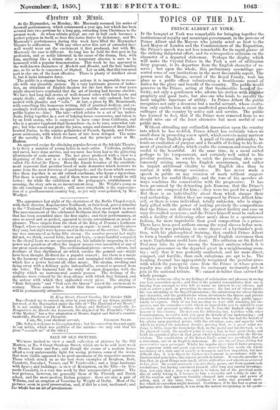The appearance last night of the choristers of the Berlin
Chapel-royal, with their director, Kapelmeister Neidhardt; at their head, gave a stimulus to thee" National. Concerts," of which, in truth, they stood much in need. The.announceinent of the celebrated Berliners, drew the largest audience that has been assembled since, the first night; and their performances,. at once so novel and so perfec; appeared to create astonishment as much as pleasure. These singers form the choir of the King of Prussia's Lutheran Chapel, where no instrument—not even an organ—is used ; and the pieces they. sang last night were hymns used in the course of the service. The cho- rus. was announced as being fifty strong : the number present last night did-not, we think, exceed forty, men and boys,—a mere handful compared to the choral hosts we are accustomed to, but infinitely surpassing in real power and grandeur of effect the largest masses ever assembled at any of our great.music-meetings. The ecclesiastical. pieces—severe, solemn, and destitute of that. rhythmical air which catches the , general ear-,—might • have been thought ill-fitted for a popular concert; but there is a• magic in the harmony of human voices, pure and unmingled with other-sounds, which has a power beyond all other music. The strains, swelling and dying away with a delicacy quite indescribable, seemed to proceed from one voice. The harmony had the unity of organ diapasons, with the vitality which no instrumental sounds possess. The feelings, of the audience were evinced by the deep silence with which they listened, and the ardour with which they applauded every piece. The singing of "Rule Britannia" and "God save the Queen" raised the excitement to ecstasy. There cannot. be a doubt that• these exquisite performances will•he permanently attractive.


























 Previous page
Previous page